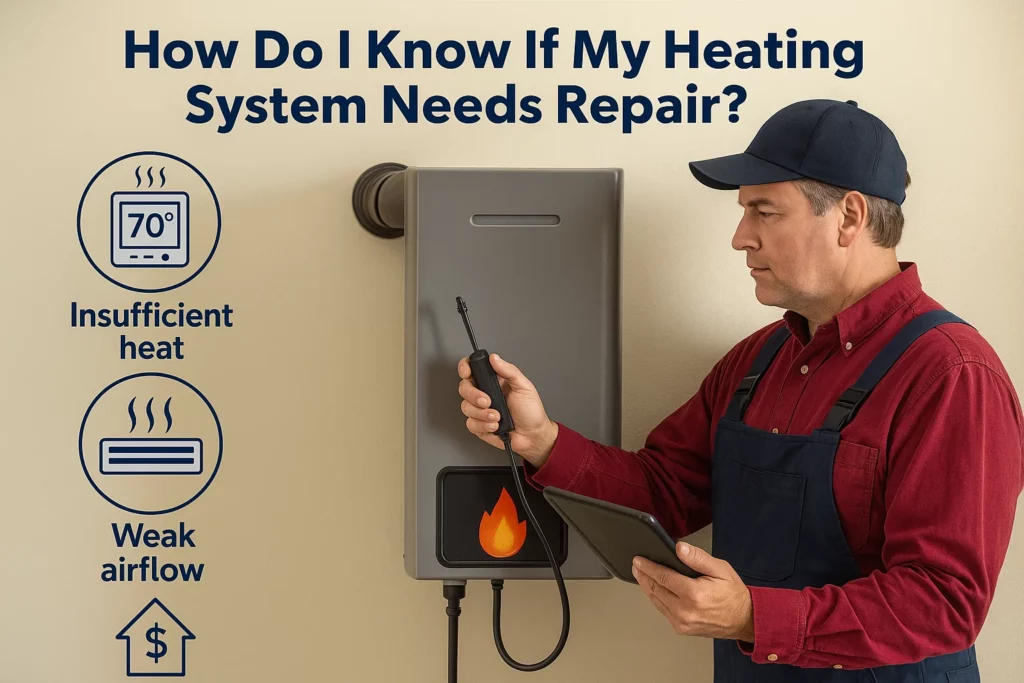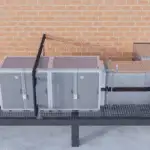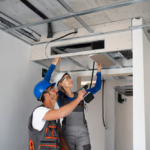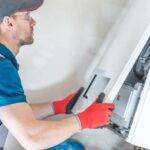As the temperature drops, a reliable heating system is key to a cozy home. But, like any machine, your heating system can have issues. This can make it less efficient and raise your energy bills. Spotting early signs of heating system problems is vital to avoid expensive fixes and keep your home warm.
At our company, we focus on top-tier HVAC solutions for year-round comfort. We aim to give you peace of mind and a cozy home. In this article, we’ll look at the main signs your heating system needs fixing. This will help you catch problems before they get worse.
Key Takeaways
- Spotting early signs of heating system problems can help avoid costly heating repairs.
- A reliable heating system is key for a comfy home in cold weather.
- Top-tier HVAC solutions offer peace of mind and a cozy living space.
- Regular maintenance extends your heating system’s life.
- Ignoring heating system problems can lead to higher energy bills and less efficiency.
The Importance of Recognizing Heating System Problems Early
Spotting heating system problems early is key to a cozy and safe home. A working heating system is vital, more so in winter. Yet, heating systems can face issues over time.
How Early Detection Saves Money and Prevents Discomfort
Finding heating system problems early can save you money and keep you comfortable. It helps avoid expensive fixes later on. Here are some benefits:
- Reduced Repair Costs: Catching small problems early can prevent big ones.
- Improved Efficiency: A well-kept heating system uses less energy, cutting down your bills.
- Extended System Lifespan: Regular care and quick fixes can make your system last longer.
Long-term Cost Benefits of Timely Repairs
Fixing problems quickly saves money now and later. Early fixes can stop expensive repairs or even a new system.
Preventing Minor Issues from Becoming Major Breakdowns
Ignoring small problems can lead to big breakdowns. Regular checks and upkeep can spot these early, keeping your system running well.
Safety Concerns with Malfunctioning Heating Systems
Broken heating systems can be dangerous, leading to carbon monoxide poisoning and fires. Knowing these risks and acting fast is vital if you see any problems.
Carbon Monoxide Risks with Combustion Systems
Heating systems that burn fuel can release carbon monoxide. Regular checks ensure your system is safe and working right.
Fire Hazards from Electrical Components
Electrical parts in heating systems can be fire risks if they fail. Keeping your system in good shape can lower this risk.
Understanding the need for early detection and taking action can keep your heating system safe and efficient. This ensures your home stays cozy and safe all year. Stay cool, breathe easy, and enjoy comfort by watching over your heating system’s health.
How Do I Know If My Heating System Needs Repair? Common Warning Signs
Your heating system is key to your home’s comfort. Knowing the signs of trouble is important. Get the best HVAC help by spotting these warning signs early.
Strange Noises Coming from Your Heating System
Unusual sounds from your heating system can mean trouble. Sounds like banging, whistling, or grinding point to different problems.
Banging, Whistling, and Grinding Sounds Explained
Banging sounds often mean loose or broken parts. Whistling might be due to air leaks or duct issues. Grinding sounds suggest worn-out parts or fan problems.
Inconsistent or Insufficient Heating Throughout Your Home
Uneven heating is a big warning sign. It can cause cold spots or changing temperatures in your home.
Cold Spots and Temperature Fluctuations
Cold spots suggest air distribution problems. This could be due to duct leaks or blocked vents. Fluctuating temperatures might mean a faulty thermostat or heating system issue.
Thermostat Setting vs. Actual Temperature Discrepancies
A big gap between your thermostat setting and home temperature is a red flag. It could point to a thermostat problem or heating system failure.
“A well-maintained heating system is key to a comfortable home. Regular checks can help identify issues before they become major problems.”
HVAC Expert
Unusual Odors When Your Heating System Runs
Strange smells from your heating system are a warning. Burning or gas odors are serious and need quick action.
Burning Smells: When to Be Concerned
A burning smell means dust buildup or a serious issue like a cracked heat exchanger. It’s vital to get a professional to check it out.
Gas Odors and Emergency Procedures
Gas odors are a serious danger. Turn off your heating, open windows, and call a pro. Gas leaks can cause explosions or carbon monoxide poisoning.
Spotting strange noises, uneven heating, and odd smells early can help keep your home comfy and safe.
Rising Energy Bills: A Key Indicator of Heating System Issues
Rising energy bills can be frustrating. But they also warn of heating system problems. It’s key to understand how rising costs affect your heating system’s efficiency.
Understanding Normal Seasonal Bill Fluctuations vs. Problem Indicators
Energy bills change with the seasons. This is due to temperature and heating demand changes. But a big or sudden jump might mean a heating system issue.
Analyzing Your Utility Bills for Patterns
Start by looking at your utility bills over time. Search for patterns or odd changes that show your heating system might not be working right.
Year-over-Year Comparison Methods
Compare your energy bills from year to year for the same time. This can show if there’s a big increase that might be due to your heating system’s performance.
How Inefficient Heating Systems Impact Your Wallet
Inefficient heating systems raise your energy bills and can cause expensive repairs if not fixed. Knowing the cost can push you to get maintenance and repairs on time.
Calculating the Cost of Delayed Repairs
Waiting to fix issues can cause more damage and higher energy use. Figuring out the cost of delayed repairs shows why fixing problems quickly is important. Read more: What is the cost of heating repair?
- Identify the cost of the repair or replacement needed.
- Consider the possible increase in energy bills due to inefficiency.
- Think about any extra damage that might happen if the issue isn’t fixed.
Energy Efficiency Ratings and What They Mean
Knowing about energy efficiency ratings helps you choose the right heating system. Look for systems with high AFUE (Annual Fuel Utilization Efficiency) ratings. They use less energy.
By watching your energy bills and acting early, you can spot heating system problems. This saves money and keeps your home cozy.
Visual Inspection: What to Look for in Your Heating System
Checking your heating system regularly is key to spotting problems early. This helps keep it running well and safely all season long.
Checking for Visible Damage or Wear
Start by looking for any damage or wear on your heating system. Check for dents, rust, or corrosion on the outside of the furnace or boiler.
Inspecting Ductwork and Insulation
Next, examine the ductwork for leaks, damage, or loose connections. It’s also important to check if ducts are well-insulated. Make sure ducts are sealed and insulated to avoid heat loss.
Identifying Corrosion and Rust Issues
Corrosion and rust can harm your heating system. Look for rust or corrosion on metal parts. If you find any, it’s best to get a professional’s help.
Inspecting Vents, Filters, and Accessible Components
Don’t forget to check vents, filters, and other parts you can easily reach. Make sure filters are clean and vents are clear.
Filter Condition Assessment
A dirty filter can hurt your system’s performance. Check your filters every month and change them when needed for good airflow.
Vent Blockage Identification
Make sure vents are open and not blocked. Blocked vents can make your system less efficient and raise your energy bills.
| Component | Inspection Criteria | Action Required |
| Ductwork | Leaks, damage, or disconnections | Seal or replace damaged sections |
| Filters | Dirt or clogs | Replace if dirty or clogged |
| Vents | Blockages or obstructions | Clear any blockages |
Warning Lights and Error Codes on Modern Heating Systems
Modern heating systems often have digital controls that show error codes or warning lights when there’s a problem.
Decoding Common Error Messages
Look in your system’s manual to understand error codes or warning lights. This can help you figure out what’s wrong.
Using Manufacturer Resources for Troubleshooting
Manufacturers usually have tools and resources for troubleshooting. Use these to diagnose and possibly fix issues with your heating system.
Furnace and Boiler-Specific Warning Signs
Every heating system, like gas furnaces, electric furnaces, boilers, or heat pumps, shows signs of trouble. Knowing these signs is key to keeping your home cozy. Spotting these early can prevent big breakdowns and expensive fixes.
Gas Furnace Problems: Pilot Light Issues and Burner Concerns
Gas furnaces need a pilot light to start the burner. Trouble with the pilot or burner can cause heating issues or safety risks.
Pilot Light Color and What It Indicates
A good pilot light flame is blue. Yellow or orange means bad combustion, which can make carbon monoxide. If your flame looks off, get your furnace checked.
Burner Flame Patterns and Troubleshooting
The burner flame should be steady and blue. If it flickers or is yellow, it might be a burner or gas problem. Regular checks can catch these issues early.
Electric Furnace Troubleshooting
Electric furnaces have parts that can fail, like heating elements and blower motors.
Heating Element Issues
Heating elements can wear out. Look for a big drop in heating or visible damage. Replacing them can fix efficiency issues.
Blower Motor Problems
A bad blower motor means poor air flow. Listen for odd noises or weak air flow. Keeping it maintained can stop motor failure.
Boiler System Warning Signs
Boilers show signs of trouble, like pressure gauge readings and water leaks.
Pressure Gauge Readings and What They Mean
| Pressure Reading | Indication | Action |
| Too Low | Potential leak or insufficient water | Check for leaks, refill system |
| Too High | Overpressure, risk of explosion | Release pressure, inspect system |
Water Leaks and Their Sources
Water leaks near a boiler mean corroded pipes or loose connections. Regular checks can find leaks before they damage the system.
Heat Pump Malfunction Indicators
Heat pumps show signs of trouble, like defrost cycle issues or refrigerant leaks.
Defrost Cycle Problems
The defrost cycle is key for heat pump efficiency. Trouble here means poor heating. Look for ice or odd noises during defrost.
Refrigerant Leak Symptoms
Refrigerant leaks cut efficiency and raise energy costs. Watch for hissing, ice on the outdoor unit, or poor heating.
Being alert to these signs can help fix heating system problems early. This keeps your home warm and safe. You’ll feel good knowing you’re taking care of your heating system.
Smart Technology and Modern Diagnostic Tools
Smart technology has made it easier for homeowners to check and fix heating system problems. This tech helps keep systems running well and fixes issues early on.
How Smart Thermostats Can Alert You to Problems
Smart thermostats use advanced sensors and algorithms to spot heating system problems. They send alerts for things like temperature changes or system failures.
Interpreting System Alerts and Notifications
It’s important to understand what your smart thermostat’s alerts mean. These messages can tell you about clogged filters, leaks, or ignition issues.
Using Usage Data to Spot Inefficiencies
Smart thermostats also track how you use your heating system. This data helps you see where you can improve and make smart maintenance choices.
| Diagnostic Tool | Purpose | Benefit |
| Smart Thermostats | Monitor system performance | Early issue detection |
| Temperature Guns | Measure temperature variations | Identify system inefficiencies |
| Carbon Monoxide Detectors | Detect CO leaks | Enhanced safety |
DIY Diagnostic Tools for Homeowners
Homeowners can use DIY tools like temperature guns and carbon monoxide detectors. These tools help spot problems.
Temperature Guns and Their Applications
Temperature guns measure temperature changes in your heating system. They show where your system might not be working efficiently.
Carbon Monoxide Detectors as Safety Tools
Carbon monoxide detectors are key for safety. They warn you of CO leaks from your heating system.
Professional Diagnostic Equipment and What It Reveals
HVAC technicians use special tools to check and fix heating system problems. This equipment gives them detailed info on system performance and helps find the main cause of issues.
When to DIY vs. When to Call a Professional
As a homeowner, you often wonder if you should fix heating system problems yourself or call a pro. Knowing your limits and when to ask for help is key.
Simple Fixes Homeowners Can Safely Perform
Some heating system problems are easy to fix on your own. For example, checking your thermostat or changing filters doesn’t need a pro.
Thermostat Troubleshooting Steps
To fix your thermostat, first check the power source and settings. If it’s a smart thermostat, try restarting it or update the software.
Filter Replacement Procedures
Changing filters is simple. Just turn off your heating, find the filter, and swap it for a new one that fits.
Situations That Always Require Professional Attention
While some fixes are DIY, others need a pro. Gas problems and electrical failures are two examples that require immediate help.
Gas-Related Issues
Gas leaks or furnace problems are serious. If you think there’s a leak, get out of your house fast and call a pro.
Electrical Component Failures
Electrical issues, like bad wiring or circuit boards, are dangerous. It’s safer to let a qualified HVAC tech handle these repairs.
Finding a Qualified HVAC Technician
When you need a pro, finding the right HVAC tech is important. Look for someone with the right certifications and experience.
Certification and Experience Requirements
Make sure the tech you choose is certified by a trusted group, like NATE or HVAC Excellence. Also, check if they have experience with systems like yours.
Questions to Ask Before Hiring
Before you hire an HVAC tech, ask about their experience, prices, and when they’re available. It’s also smart to check online reviews and ask for references.
| Certification | Description | Benefits |
| NATE | North American Technician Excellence | Ensures technician competence in HVAC systems |
| HVAC Excellence | Certification for HVAC technicians | Verifies technician knowledge and skills |
Knowing when to DIY and when to call a pro helps keep your heating system running right. This keeps your home cozy and safe.
Preventative Maintenance to Avoid Heating System Repairs
By taking a proactive approach to heating system maintenance, you can avoid unexpected breakdowns. This ensures your home stays warm and comfortable all year.
Seasonal Maintenance Checklist
To keep your heating system in great shape, follow a seasonal maintenance checklist. This includes:
- Pre-winter preparation steps to ensure your system is ready for the cold months
- End-of-season shutdown procedures to properly close out the heating season
Pre-Winter Preparation Steps
Before winter arrives, make sure to:
- Inspect your heating system’s electrical connections and controls
- Check for any signs of wear or damage on components
- Ensure your thermostat is working correctly
End-of-Season Shutdown Procedures
At the end of the heating season, do the following:
- Turn off your heating system and allow it to cool
- Clean or replace filters as needed
- Inspect vents and ducts for any blockages or damage
Filter Replacement Schedule and Importance
Regular filter replacement is key for your heating system’s efficiency. Different filters last for varying periods. It’s important to know what type you have and when to replace it.
Different Filter Types and Their Lifespans
There are many types of filters, including:
- Fiberglass filters, which typically need replacement every 1-3 months
- Pleated filters, which can last up to 6 months depending on usage
- High-efficiency filters, which may require more frequent replacement due to their dense material
Impact of Filter Condition on System Performance
A dirty or clogged filter can harm your heating system’s performance. This can lead to higher energy bills and a shorter system lifespan. Regular replacement ensures good airflow and efficiency.
Professional Tune-ups: What to Expect
A professional tune-up can spot issues before they become big problems. During a tune-up, a technician will check your heating system’s components.
Components Checked During Professional Maintenance
Technicians usually check:
- Electrical connections and controls
- Burners and heat exchangers
- System controls and thermostat
Frequency Recommendations by System Type
The frequency of professional tune-ups varies by system type:
- Gas furnaces: annual tune-ups recommended
- Heat pumps: bi-annual tune-ups recommended
- Boilers: annual inspections advised
By following these preventative maintenance tips, you can enjoy a warm, comfortable home. This also helps avoid costly repairs. Prioritize regular maintenance and professional tune-ups for top-tier HVAC solutions.
Conclusion: Ensuring Your Home’s Comfort and Safety
Keeping your heating system safe and efficient is key for home comfort. Recognizing when it needs repair helps avoid discomfort and safety risks.
Regular checks and maintenance can spot problems early. This saves money and keeps your home warm and cozy all year. Stay on top of your heating system to enjoy a comfortable home.
Following the tips in this article helps your heating system work well and safely. This improves your home’s comfort and keeps it a safe, healthy place. Now, you can “Stay Cool. Breathe Easy. Live in High Comfort.”
FAQ
What are the common signs that my heating system needs repair?
Signs include strange noises, uneven or weak heating, odd smells, higher energy bills, and visible damage.
How can I identify if my heating system’s noise is a sign of a problem?
Different noises mean different problems. Bangs might mean loose parts, whistles could be air leaks, and grinding could be worn-out parts.
Why is my energy bill increasing, and could it be related to my heating system?
A higher energy bill might mean your heating system is not working well. Look at your bills over time to see if your system is the cause.
What should I look for during a visual inspection of my heating system?
Look for damage or wear, check ductwork and insulation, and look for corrosion and rust. Also, examine vents, filters, and parts you can see for problems.
How can I troubleshoot issues with my gas furnace?
Check the pilot light color. A yellow or orange flame means a problem. Also, look at the burner flame patterns. Irregular patterns can mean issues.
What are the benefits of using smart thermostats and modern diagnostic tools?
Smart thermostats can warn you of problems. They use data to show inefficiencies. Tools like temperature guns and carbon monoxide detectors can also help find issues.
When should I attempt DIY repairs, and when should I call a professional?
You can fix simple things like thermostat issues and filter changes yourself. But, if it’s gas-related, electrical, or complex, get a pro.
How can I prevent heating system repairs through maintenance?
Regular maintenance helps. Do seasonal checkups, replace filters, and get professional tune-ups. This keeps your system running well.
What should I expect during a professional tune-up for my heating system?
A tune-up checks filters, burners, and electrical connections. It makes sure your system is efficient and safe.
How often should I replace my heating system’s filter?
Filter replacement depends on type and use. Usually, replace filters every 1-3 months for best system performance.




